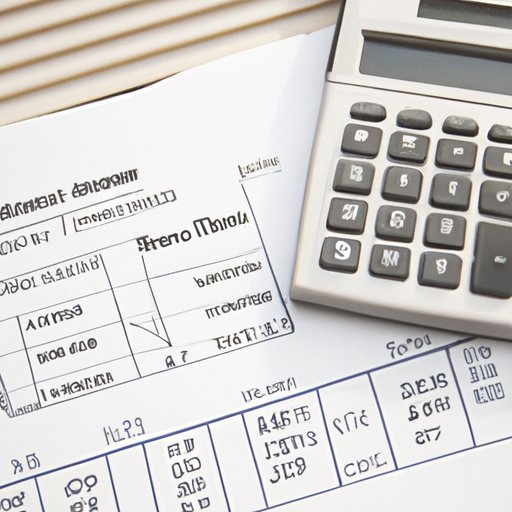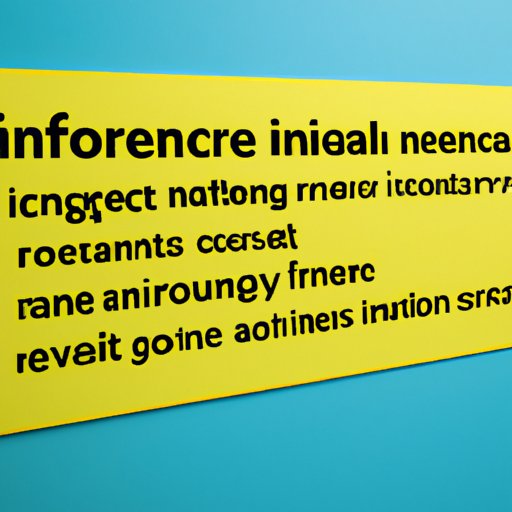Introduction
Refinancing is the process of replacing an existing loan with a new loan with different terms. People typically refinance their homes in order to get a lower interest rate, switch from an adjustable-rate mortgage (ARM) to a fixed-rate mortgage, shorten the term of their loan, or to access the equity in their home. Refinancing can be a great way to save money, but it also comes with its own set of costs.

Calculating the Cost of Refinancing a Home
When you refinance your home, you’ll have to pay closing costs, which are fees associated with obtaining the loan. Closing costs can vary depending on the lender, type of loan, and the amount being borrowed. It’s important to understand all of the costs associated with refinancing before you make a decision.
Estimating Closing Costs
Closing costs generally range from 2-5% of the total loan amount, although they can be higher or lower depending on the loan and the lender. Some lenders may offer no-cost refinancing, meaning the lender will cover the closing costs. However, these offers usually come with a slightly higher interest rate. It’s important to compare the costs and interest rates of several lenders before deciding which one to go with.
Understanding Fees and Points
In addition to closing costs, you may also have to pay fees and points. A fee is a one-time charge for services rendered by the lender, such as an origination fee or an appraisal fee. Points are fees paid to the lender at closing in exchange for a lower interest rate. One point equals 1% of the loan amount.

How to Estimate the Cost of Refinancing a House
The cost of refinancing a house will depend on several factors, including the length of the loan term, type of loan, property value, loan-to-value ratio, and interest rate. To estimate the cost of refinancing your home, it’s important to shop around for quotes from several lenders and compare their rates and fees.
Comparing Rates with Different Lenders
It’s important to compare rates from multiple lenders to ensure that you get the best deal. Make sure to look at both the interest rate and the annual percentage rate (APR), which includes the interest rate plus any additional fees. It’s also a good idea to compare the closing costs and fees of each lender to make sure you’re getting the most bang for your buck.
Knowing Your Credit Score
Your credit score plays a big role in determining the interest rate you’ll be offered when refinancing your home. The higher your credit score, the lower the interest rate you’ll be offered. It’s important to check your credit score before applying for a loan so you know what to expect.
Shopping Around for Quotes
Once you’ve compared rates and fees from several lenders, it’s time to shop around for quotes. Make sure to get quotes from at least three different lenders. This will give you the best chance of finding the lowest rate and fees. Also, make sure to ask about any special programs or incentives that could help you save money.

Factors that Influence the Cost of Refinancing
There are several factors that can influence the cost of refinancing a home, including the length of the loan term, type of loan, property value, loan-to-value ratio, and interest rate. Here’s a closer look at each of these factors:
Length of Loan Term
The length of the loan term will affect the overall cost of the loan. Generally, shorter loan terms have lower interest rates, but they also require higher monthly payments. Longer loan terms have higher interest rates, but they come with lower monthly payments.
Type of Loan
The type of loan you choose will also affect the cost of refinancing. Fixed-rate mortgages have a consistent interest rate throughout the entire loan term, while adjustable-rate mortgages (ARMs) have an interest rate that can change over time. ARMs usually come with lower initial interest rates, but they can increase over time, making them more risky.
Property Value
The value of your home will also influence the cost of refinancing. The higher the value of your home, the lower the interest rate you’ll be offered. On the other hand, if your home has decreased in value, you may not be able to refinance at all.
Loan-to-Value Ratio
The loan-to-value (LTV) ratio is the amount of the loan divided by the value of the property. The higher the LTV ratio, the higher the risk for the lender, which means you may be charged a higher interest rate. Generally, lenders prefer LTV ratios of 80% or less.
Interest Rate
The interest rate you’re offered when refinancing your home will depend on several factors, including your credit score, loan type, and loan-to-value ratio. It’s important to compare rates from multiple lenders to make sure you’re getting the best deal.
Understanding Closing Costs When Refinancing Your Home
When you refinance your home, you’ll have to pay closing costs, which are fees associated with obtaining the loan. Closing costs can vary depending on the lender, type of loan, and the amount being borrowed. Here’s a closer look at some of the most common closing costs:
Title Insurance
Title insurance protects the lender from any losses due to liens or legal claims against the property. Title insurance premiums can range from 0.5-1.5% of the loan amount, depending on the lender.
Appraisal Fee
An appraisal is required to determine the current market value of the property. Appraisal fees can range from $200-$600, depending on the size and location of the property.
Origination Fee
An origination fee is a fee charged by the lender to cover administrative costs. Origination fees can range from 0.5-1% of the loan amount.
What Fees are Associated with Refinancing a Home?
In addition to closing costs, there may be other fees associated with refinancing a home. These fees can include prepayment penalties, mortgage broker fees, and discount points. Here’s a closer look at each of these fees:
Prepayment Penalties
Some lenders may charge a prepayment penalty if you pay off your loan early. These fees usually range from 1-3% of the remaining balance.
Mortgage Broker Fees
If you use a mortgage broker to help you find the best loan, you may have to pay a fee. Mortgage broker fees can range from 1-2% of the loan amount.
Discount Points
Discount points are fees paid to the lender at closing in exchange for a lower interest rate. One point typically equals 1% of the loan amount.
Tips for Reducing the Cost of Refinancing a House
Refinancing your home can be a great way to save money, but it also comes with its own set of costs. Here are some tips to help you reduce the cost of refinancing your home:
Shop Around for the Best Rates
It’s important to compare rates from multiple lenders to ensure that you get the best deal. Make sure to look at both the interest rate and the annual percentage rate (APR), which includes the interest rate plus any additional fees.
Know Your Credit Score
Your credit score plays a big role in determining the interest rate you’ll be offered when refinancing your home. The higher your credit score, the lower the interest rate you’ll be offered. It’s important to check your credit score before applying for a loan so you know what to expect.
Consider an Adjustable Rate Mortgage
Adjustable-rate mortgages (ARMs) usually come with lower initial interest rates, but they can increase over time. If you’re planning on staying in your home for a short period of time, an ARM may be the better option.
Pay Attention to Fees
Make sure to compare the closing costs and fees of each lender to make sure you’re getting the most bang for your buck. In addition to closing costs, you may also have to pay fees and points. It’s important to understand all of the costs associated with refinancing before you make a decision.
Ask About Special Programs
Make sure to ask about any special programs or incentives that could help you save money. Some lenders may offer no-cost refinancing, meaning the lender will cover the closing costs. However, these offers usually come with a slightly higher interest rate.
Conclusion
Refinancing your home can be a great way to save money, but it also comes with its own set of costs. It’s important to understand all of the costs associated with refinancing before you make a decision. Make sure to compare rates and fees from several lenders and ask about any special programs or incentives that could help you save money. By taking the time to do your research, you’ll be able to find the best deal for your situation.
(Note: Is this article not meeting your expectations? Do you have knowledge or insights to share? Unlock new opportunities and expand your reach by joining our authors team. Click Registration to join us and share your expertise with our readers.)
